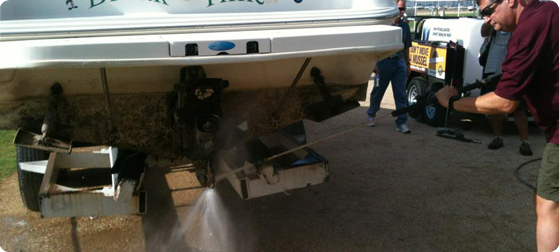Projects
-
Building Consensus in the West: Developing a Model Legal Framework for Watercraft Inspection and Decontamination Programs

“Building Consensus in the West,” was an initiative of the Western Regional Panel on Aquatic Nuisance Species that ran from 2011 - 2019. The goal of the WRP initiative was to develop a multi-state vision for watercraft inspection and decontamination (WID) programs. The National Sea Grant Law Center was an active participant in this initiative, providing legal research support and leading efforts to develop model legislation and regulations for WID Programs. Read more about the Building Consensus initiative and its outcomes in this Final Activity Report.
- Model Legal Framework
In April 2014, the National Sea Grant Law Center and the Association of Fish and Wildlife Agencies released “Preventing the Spread of Aquatic Invasive Species by Recreational Boats: Model Legislative Provisions & Guidance to Promote Reciprocity among State Watercraft Inspection and Decontamination Programs.” These Model State Legislative Provisions were developed for two purposes. First, the provisions offer guidance to states with existing WID programs to create a foundation for multi-state reciprocity. Second, for states without WID programs, the provisions outline a legal framework for the authorization of new WID programs.
- Download Model State Legislative Provisions
- The “Model Regulation for State Watercraft Inspection and Decontamination Programs” outlines a model regulatory framework to implement a package of recommended approaches for state WID programs as identified by the WRP Building Consensus Committee. It serves as a bridge between the model legislative provisions and model agency protocols developed through the Building Consensus process. The Model Regulation are designed to facilitate regional cooperation and coordination by laying the foundation for the adoption of reciprocal agreements among states adhering to these recommended approaches.
- Download the Model Regulation
- To assist state natural resource managers and policy-makers in identifying commonalties, differences, and gaps among states, the NSGLC undertook a review of each state’s WID laws and regulations to see how each state’s program compared to the authorities set forth in the Model State Legislative Provisions and Model Regulation. This companion report, updated in December 2018, contains a summary of the NSGLC findings for 50 states and detailed state-by-state comparisons for the nineteen states with WID programs.
- Download Companion Report
- To view an infographic providing a snapshot summary of the state comparison report, click here.
- In May 2024, the Law Center reviewed legislative and regulatory activity in each of the 50 states to assess progress since December 2018. Between January 2019 and May 2024, 15 states enacted legislation or regulations to adopt new or amend existing WID requirements.
- Download 2024 Legislative and Regulatory Update
- The “Model Memorandum of Understanding for Watercraft Inspection and Decontamination Programs” provides a model framework for the formalization of interstate and regional collaborations through the development of written agreements. The Model MOU is designed to facilitate the development of agreements that would enable parties to engage in some form of reciprocity, such as accepting each other’s inspection or decontamination paperwork. It outlines key considerations that should be addressed by the parties during negotiations and provides template language for major provisions. With the publication of the Model MOU, policymakers and regulators now have access to a model legal framework identifying model WID provisions from legislation through implementation.
- Download the Model MOU
- Legal Research
Quagga mussels have spread rapidly in the Colorado River watershed since the discovery of the mussels in Lake Mead, Lake Mojave, and Lake Havasu in 2007. Management efforts are complicated by the fact that the Lower Colorado River (LCR) is a highly inter-jurisdictional management area. To help lay a foundation for future discussions among federal, state, tribal, and local entities with jurisdiction along the LCR, the National Sea Grant Law Center received funding from the U.S. Fish and Wildlife Service to conduct an analysis of current laws and regulations of these twenty-one jurisdictions to identify existing legal authorities that could support state efforts to implement consensus WID policies. Our final report entitled “Comparative Analysis of Watercraft Inspection and Decontamination Requirements along the Lower Colorado River” starts by summarizing the legal framework in the three states. The authority of the federal land management agencies, local governments, and tribal governments is then examined in turn. Opportunities to increase coordination and cooperation are highlighted and discussed for each level of government. - Download the Lower Colorado River WID Report
To enhance collaborative learning at the start of the Building Consensus initiative during the Phoenix workshop, project leaders identified several key legal issues that needed to be addressed in the region. Background papers were drafted for workshop attendees, which were further developed into five articles published in the Spring 2013 issue of the Arizona Journal of Environmental Law and Policy and available at https://ajelp.com/vol-3. The issue consist of the following articles:
-
- Legislative and Regulatory Efforts to Minimize Expansion of Invasive Mussels through Watercraft Movements
- Preventing the Spread of Zebra and Quagga Mussels: The Role of the Lacey Act
- Are State Watercraft Inspections Constitutionally Permissible Searches?
- Assessing the Viability of Zebra and Quagga Mussels: Legal & Enforcement Challenges
- Privacy Issues Surrounding the Tracking and Sharing of Boat Movement Information as Part of Invasive Species Prevention Programs
Questions About Projects?
Have questions or comments about projects at the National Sea Grant Law Center?
Feel free to contact us!
Work With Us
Interested in working with us?
Download our range of services:










